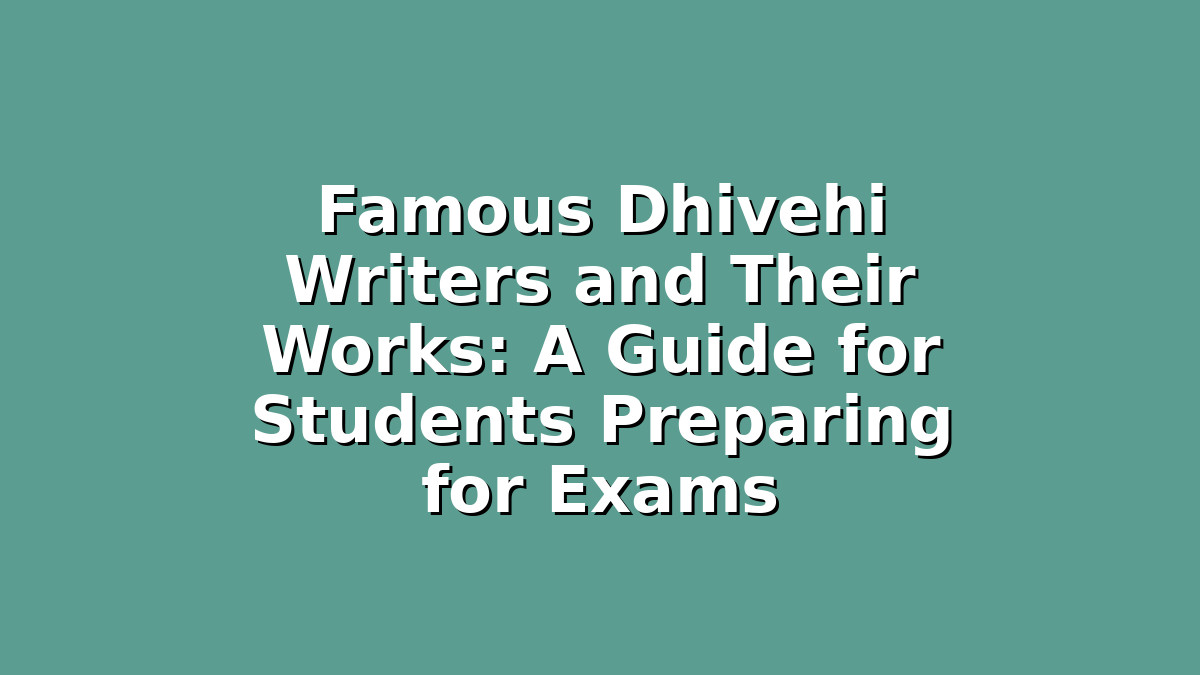Studying literature is an essential part of the academic journey for many students, especially those focusing on the Dhivehi language and its rich cultural heritage. Understanding the works of famous Dhivehi writers not only helps students excel in exams but also deepens their appreciation of Maldivian history, society, and values. If you are preparing for your exams or simply want to improve your study habits, this guide will introduce you to some of the most influential Dhivehi authors and offer practical tips to help you master their works effectively.
1. Understanding the Importance of Dhivehi Literature in Exams
Dhivehi literature is a window into the Maldives’ unique culture and social fabric. The language itself, with its poetic rhythm and historical depth, presents a fascinating study area for students. However, when exams approach, it can be overwhelming to memorize every detail or understand complex literary themes.
Study Tip: Create a Study Schedule Focused on Literature
To manage your study time efficiently, break down your literature syllabus into manageable sections. Allocate specific days to focus on individual writers or their major works. For instance, spend one day studying the poetry of a particular author and another day reviewing their prose or stories. Regularly revisiting material helps reinforce your understanding and retention.
2. Famous Dhivehi Writers and Their Contributions
#### a. Ibrahim Shihab
Ibrahim Shihab is one of the most celebrated figures in Dhivehi literature. Known for his poetic works as well as prose, Shihab’s literature often reflects themes of patriotism, social justice, and personal introspection. His poems explore the beauty of the Maldives and the complexities of human emotions.
Study Advice: Analyze Themes and Literary Devices
When studying Ibrahim Shihab’s poetry, focus on identifying recurring themes such as love for the homeland or social issues. Pay attention to literary devices like metaphor, simile, and imagery. Making notes on these aspects will help you craft well-rounded answers in exams. Try summarizing each poem in your own words to ensure you grasp the main ideas.
#### b. Hussain Salaah
Hussain Salaah is renowned for his short stories and essays that bring out the everyday life and struggles of Maldivians. His narratives are simple yet powerful, often highlighting moral lessons and cultural values.
Study Advice: Practice Writing Essays and Summaries
To prepare for exams involving Hussain Salaah’s works, practice writing brief summaries of his stories. This exercise improves comprehension and your ability to express ideas clearly. Additionally, try writing short essays discussing the moral or cultural significance of his works. This helps you gain confidence in structuring your answers logically.
#### c. Aminath Faiza
Aminath Faiza is a prominent female voice in Dhivehi literature, best known for her evocative poetry that explores themes of nature, womanhood, and resilience. Her works often inspire readers to reflect on personal and societal challenges.
Study Advice: Connect Literature to Personal Experiences
When studying Aminath Faiza’s poems, try relating the themes to your own life or broader societal issues. This personal connection makes it easier to remember key points and adds depth to your exam responses. Discussing poetry with classmates or teachers can also provide new perspectives and enhance your understanding.
3. Effective Study Techniques for Dhivehi Literature
Beyond knowing the authors and their works, mastering Dhivehi literature requires strategic study techniques:
– Use Mind Maps: Create visual mind maps linking authors, their major works, themes, and literary devices. This helps organize information and improves recall.
– Recite and Listen: Dhivehi poetry is rhythmic. Reading poems aloud or listening to recorded recitations can improve your memory and appreciation of the language’s musicality.
– Group Study Sessions: Discussing literary works in groups encourages active learning and exposes you to different viewpoints. Teaching others what you have learned is a powerful revision tool.
– Practice Past Exam Papers: Familiarize yourself with exam formats and typical questions related to Dhivehi literature. Time yourself while answering to build exam readiness.
Conclusion
Famous Dhivehi writers like Ibrahim Shihab, Hussain Salaah, and Aminath Faiza offer a treasure trove of literary works that enrich your understanding of Maldivian culture and language. By studying their writings with a clear plan and effective strategies, you can excel in your exams and develop a lifelong appreciation for Dhivehi literature. Remember, consistent effort combined with smart study methods will make your preparation both productive and enjoyable. Keep exploring, keep practicing, and success will follow!

Responses